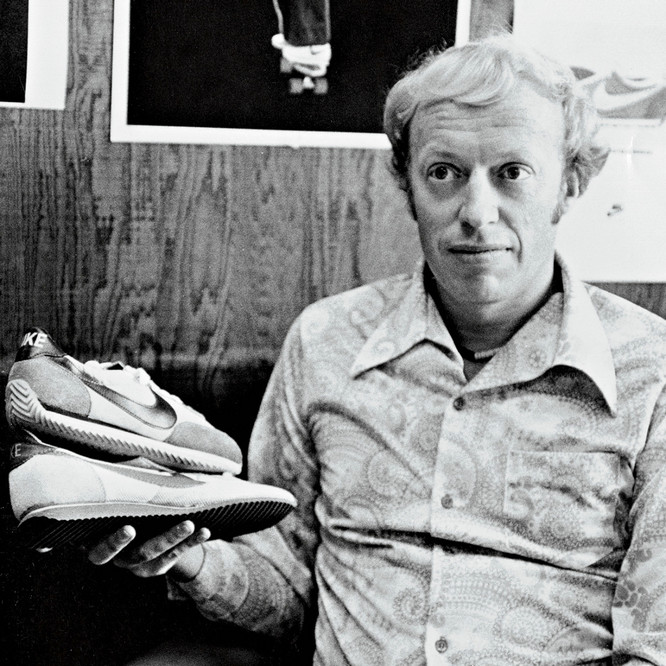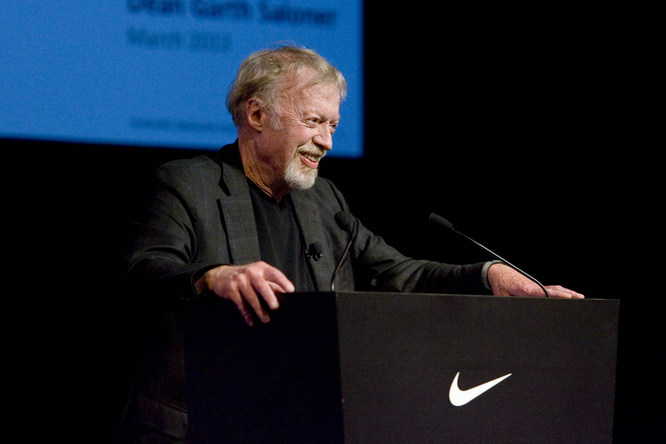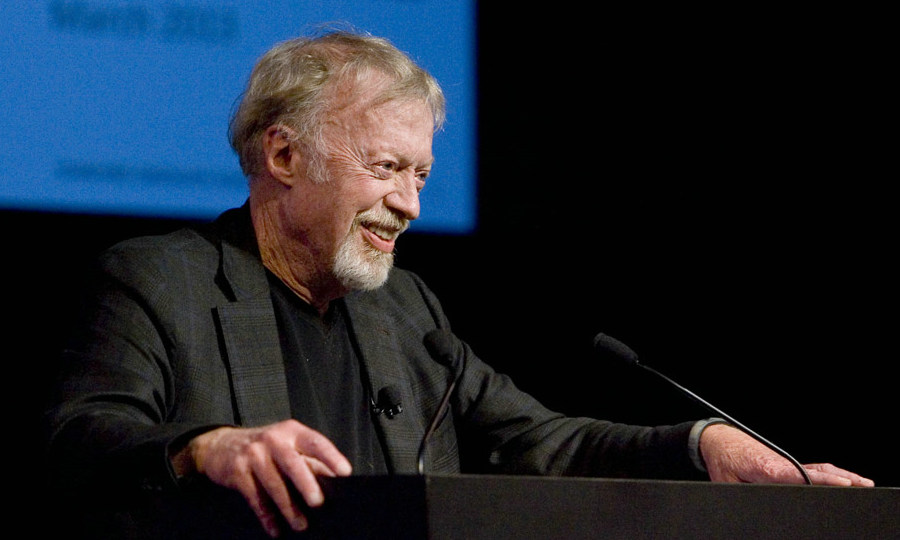In the vast cosmos of commerce, Phil Knight sketched out the majestic tapestry of Nike's global sports empire with a humble running shoe as his pen. His tale is a symphony of dreams and adventure, an ode to innovation and perseverance, a recurring defiance against the impossible that has forged today's realm of sports.

Dream Takes Flight: From a Napkin Sketch to a Sports Kingdom
In 1962, Phil Knight, a young accountant with a heart full of passion for running and dreams of the future, sat in a Portland diner. There, he drew a simple yet profound sketch on a napkin – the blueprint of his dream to establish a company that would revolutionize the athletic footwear industry. That napkin held the first design for what would become a multi-billion-dollar empire.
Starting out, Knight confronted immense obstacles: banks denying loans, formidable competitors, and an unfamiliar, uncertain market. By day, he was an accountant; by night, a salesman, even delivering shoes to retailers personally. Knight recalled, "There were times I felt like rowing in a dark sea, unsure when dawn would break." Amidst solitude and uncertainty, his resolve never wavered.
A turning point emerged in the early 1970s with the invention of the Waffle Trainer, inspired by a breakfast waffle iron. This innovative design significantly enhanced traction, marking a pivotal moment in Nike's early triumphs. It was the culmination of countless failures and experiments, echoing Knight's sentiment that "success is a series of small failures, the key is whether you persist."
The oil crisis of the late 1970s plunged the global economy into turmoil, threatening Nike's survival with inventory backlogs and strained cash flow. Knight demonstrated decisive leadership, slashing costs, refining supply chains, and boldly investing in marketing, notably through endorsements from athletes like Steve Prefontaine. This strategic pivot marked Nike's transformation from a startup to an industry behemoth.
The 1972 Munich Olympics proved a pivotal moment for Nike, despite lacking sponsorship status. Knight recognized it as a platform to showcase the brand. He procured the iconic "Swoosh" logo for $35 from a design student, a symbol of speed and victory that soon became synonymous with Nike. That same year, BRS was renamed Nike, after the Greek goddess of victory, embodying the brand's lofty aspirations.
Under Knight's stewardship, Nike flourished, with annual revenues soaring from 28millionintheearly1980sto9.5 billion by 2000, and its stock market value multiplying over 200-fold. Behind this growth were continuous product innovations such as the Air Jordan line and strategic alliances with elite athletes like Michael Jordan and Roger Federer, adding weight to Nike's success.

Phil Knight and Nike's Leap Forward
Back in the early 1980s, while Nike was making waves in the sports shoe market, competition intensified with Adidas and Reebok closing in. Knight understood that to stand out amidst fierce rivalry, extraordinary measures were needed. He remarked, "In the ocean of business, you either ride the waves or sink beneath them."
Spotting potential in rising basketball star Michael Jordan, who despite showing promise in college had yet to prove himself in the NBA, Knight saw beyond an athlete – he saw someone who could redefine the game. In 1984, Knight made a groundbreaking move, signing Jordan to a contract worth 500,000peryearplusstockoptions,acolossalsumconsideringJordan′srookiesalarywasjust630,000. It was a gamble, but Knight believed Jordan's worth transcended the court, stating, "Great athletes create legends that surpass the arena."
The Air Jordan series, launched soon after, featuring unprecedented designs that excelled both on the court and sparked a streetwear sensation. Jordan's iconic dunk in the AJ1 not only etched a classic moment but catapulted the AJ series to fame, skyrocketing sales.
Numbers don't lie. The introduction of the Air Jordan line saw Nike's basketball shoe sales leap by 130% in the first year, with Jordan-branded products' revenue surging from 9millionin1985tonearly700 million by 1990. Knight's foresight was vindicated, inaugurating a new era of athlete-endorsed footwear.

Innovation & Brand Craftsmanship: The Cultural Revolution of Just Do It
By 1988, Nike had secured its footing in the athletic shoe market, yet Phil Knight recognized that maintaining growth amid intensifying competition necessitated bold transformation. Nike's image verged on stale, urgently requiring a revitalizing force. Enter "Just Do It," a succinct and impactful slogan that transcended mere advertising jargon to embody Knight's personal philosophy.
The debut of "Just Do It" featured an 80-year-old Walt Stackhouse skydiving in a television commercial, challenging age and fear – a perfect manifestation of the "Just Do It" spirit. Knight elucidated, "We aimed to convey a spirit beyond the product itself, the courage to act." The ad, akin to a pebble in tranquil waters, ignited ripples that sparked a cultural revolution.
Why "Just Do It" Became a Cultural Icon
1. Resonance: Its simplicity and power struck chords universally, transcending age, gender, and race, encouraging all to conquer fears and pursue dreams.
2. Narrative: Nike's subsequent ads, from Jordan’s flights to Kobe’s pre-dawn L.A., and countless tales of ordinary people challenging themselves, were woven around "Just Do It," enriching the brand's storytelling.
3. Timeliness: It arrived at the dawn of the 1990s, coinciding with the rise of individualism and a societal thirst for self-expression, perfectly aligning with the zeitgeist.
Post-"Just Do It," Nike's annual sales surged from 877millionin1988to9.78 billion in 1998, nearly a tenfold increase. Brand recognition and market share rose in tandem, with "Just Do It" becoming the core driver of brand value. Knight's strategy proved that emotional resonance and commercial success could coexist.

Maxims and Ideals in Action
· "Have the courage to follow your dreams wherever they lead." Knight's own story began with a 1962 napkin sketch and a $500 investment importing Japanese running shoes, illustrating that dreams needn't grand beginnings but brave starts.
· "Success isn't permanent, and failure isn't fatal; it's courage that counts." Faced with financial crises in the 1970s, Knight persevered, innovating with the Waffle Trainer and signing Steve Prefontaine, exemplifying Nike's resilience.
· "Investing in talent is investing in the future." Knight's $500,000-a-year deal with Michael Jordan and the launch of Air Jordans in 1984 transformed the industry, showcasing his foresight and appreciation for human capital.
· "We're not just selling shoes, we're selling dreams." "Just Do It" wasn't merely a marketing coup but a cultural symbol, embodying Knight's vision of Nike as a beacon of aspiration and courage.

Deep Dive: Global Strategy & Social Responsibility
· Knight envisioned global reach in the 1970s, expanding Nike's footprint across continents. This strategic expansion not only solidified Nike's leadership but also exported the joy of sport worldwide.
· "Our success must not come at the expense of the planet or others." In the 21st century, Knight prioritized environmental sustainability and fair labor practices, implementing green initiatives, using recyclables, and ensuring ethical treatment within supply chains via the Fair Labor Association.
· "Through sports, we can unlock children's potential, making them believe the impossible is possible." Nike's "Made to Play" initiative, under Knight, promoted health and social engagement among kids globally, especially in underserved areas, impacting millions positively.
Epilogue: Echoes of a Legend
Knight's journey, characterized by courage, innovation, and responsibility, transformed him from an accountant into the architect of the world's most influential sports brand. Each step echoed the "Just Do It" mantra, inspiring generations with the lesson that with dreams and courage, nothing is unattainable. The Knight-Nike legacy remains an unfinished tome, each chapter sparking with innovation and challenge, reminding us that great endeavors start small, but the stage for dreams is boundlessly vast.

